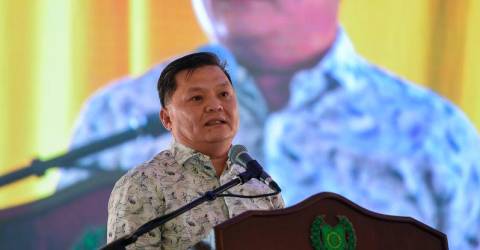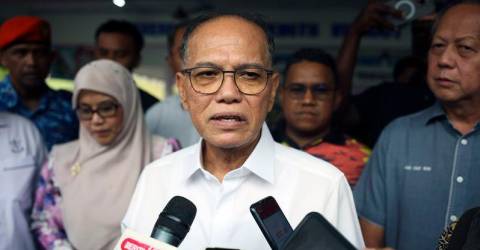ADVERTISE HERE
KUCHING: Writing a biography is akin to unraveling a person’s life tapestry and history, immersing oneself in their experiences, triumphs, and pivotal moments.
It is an art of storytelling that uses a narrative to trace an individual’s journey and vividly portray their character and societal impact.
Delving into biographical writing, New Sarawak Tribune spoke with Dr. Roosfa Hashim, a prolific biographer, publisher, editor, and academic in publishing.
He is renowned for works like “Perjalanan Politik Khaled Nordin: Sebuah Biografi” (2017), “Tan Sri Dr. Mohd Shukor Mahfar: Meredah Badai, Memimpin Transformasi” (2015), and “Mohd Ghazali Abdul Rahman 1938-2007: Dari Mercu Ke Mercu” (2010), profiling influential figures in Malaysia.
Previously an editor at the National University of Malaysia (UKM) Publisher, he became Director of the International Islamic University Malaysia (IIUM) Press in 2013. He has published several books on publishing and writing and actively facilitates related courses and workshops.
Internationally, Dr. Roosfa is a board member of the International Union of Islamic Book Publishers (IUBP) in Istanbul and a Trustee of the Foundation for Workers. He has also been an Adjunct Professor at the Sultan Sharif Ali Islamic University (UNISSA), Brunei.
New Sarawak Tribune: What distinguishes biography writing from autobiography, memoir, and other forms?
Dr. Roosfa: Simply put, writing a biography falls under the category of narrating the life story of an individual, focusing on recounting the life of a person from childhood or even before their birth up to the present. Examples of biographies include works like ‘Mandela: Long Walk to Freedom’.
Biographies are often written by someone other than the subject. In contrast, autobiographies are self-written. As for memoirs, they highlight a portion of someone’s life for public consumption, still falling under the category of biography but in the form of memoir writing.
What are the keys to writing a good biography?
It requires thorough research on an individual who possesses an intriguing story to share or showcase to the public. The uniqueness of someone’s life experiences will captivate readers and encourage them to delve deeper into the biography.
In addition to writing techniques, language style, and the use of words play a crucial role in making the produced biography enjoyable to read. One crucial aspect is that biography writing must be executed in a journalistic style.
This implies the need for a well-structured plot to highlight the central figure, followed by subsequent developments. Like a novel, there should be a main character (the individual), supporting characters, and antagonists (enemies or rivals). Regarding the storyline, there should be conflict elements in the individual’s life, and incorporating more of these characteristics will make the work more engaging to read.
Furthermore, employing creative writing techniques, creating a narrative style, dialogues, monologues, and so forth, adds life to the storytelling. Without these elements, readers may become bored with the biography due to an uninteresting delivery.
How do you choose your biography subjects?
Whether they are a sports figure, artist, movie star, politician, etc., biographies can leave a record to be read, understood, reflected upon, and studied as an example for future generations.
What is crucial to consider is a life journey or story that is interesting to portray. The chosen figure must have a unique story to present to the readers. The uniqueness of this story is broad, not just limited to ‘going to school without shoes’, for instance.
Therefore, whether the chosen figure comes from an affluent or humble family background, if there is a unique or interesting aspect that can be told or used as inspiration for others, then that figure should be considered for writing.
An example of such a figure is Premier Datuk Patinggi Tan Sri Abang Johari Tun Openg. He is a unique individual, even though said to be overshadowed by his family, he still has his own uniqueness. That is one aspect that can be showcased to the readers.
What are the challenges in biography writing?
The challenges mostly depend on the subject matter. When dealing with political figures, an in-depth exploration of relevant issues is crucial to craft a nuanced comprehension of the individual, allowing the application of political theories to their persona and political roles. Only then can the narrative unfold.
In the case of Abang Johari, given the abundance of materials, it becomes essential to present them gradually for ease of readability. Crafting a compelling biography involves incorporating main and sub-plots, breaking down the narrative into sub-sub plots to enhance comprehension.
Conducting thorough research is a prerequisite before embarking on the writing journey, especially when the subject is a prominent figure. Obtaining a comprehensive profile, biodata, and curriculum vitae is necessary. Subsequently, a careful study is required to discern the narrative structure and how to best tell the individual’s story. Similar to writing other books, establishing a main picture, an overall theme, and starting with subheadings are essential. Then, writers need to assess the availability of materials against their biodata.
In the case of a prominent figure like Abang Johari, with his ongoing presence, material is readily accessible without the need to delve into archives or libraries. If existing materials are insufficient, interviews should be conducted with individuals in the subject’s life, such as teachers, close friends, classmates, and family members.
What is the state of biographical documentation in Malaysia and Sarawak?
In Malaysia, the tradition of storytelling, including oral traditions, has been ingrained for a long time. This is evident in our folklore, such as the tales of Pak Pandir and the written form like Hikayat and the legend of Hang Tuah.
However, these are considered creative writing and fiction. Historians refrain from accepting them as history due to their style and the inclusion of illogical elements, such as the mastery of numerous languages and implausible journeys.
The colonial era marked the introduction of a different approach to writing, influenced by Western traditions. British colonial officers started the documentation of their own figures through memoirs and biographies.
Eventually, this practice transitioned to local figures, with early works of figures like the former Minister of Agriculture, Aziz Ishak, focusing on specific periods such as his crisis with Tunku Abdul Rahman.
Similarly, another political figure, Khadijah Sidek, the leader of United Malay National Organisation Kaum Ibu, faced dismissal and later became the head of PAS’s women’s wing. Her memoir wasn’t published locally but was published in Hong Kong, later compiled and published in the UKM series in Hong Kong. Over time, more such publications emerged, following a observable pattern.
In the Western context, the trend started with stories of nobility and gradually shifted to tales of ordinary people, sports, and so forth. A similar pattern unfolded in Malaysia. Despite the scarcity of biographies, UKM Press spearheaded a biography and memoir series focusing on prominent figures before shifting to those on the left. However, encountering opposition to leftist figures, the project faced hurdles and had to be redirected to other publishers.
Do you think there is sufficient biographical documentation in Malaysia and in Sarawak?
In terms of quantity, the number of biographies in Malaysia is reasonable, but the distribution is uneven, with crucial figures often going undocumented. This highlights an existing cultural issue, particularly concerning religious figures such as preachers and scholars.
For instance, during a visit to Yusof Zaki Ishak’s residence in Kelantan, I met a prolific individual – a publisher, writer, translator, and editor of magazines like “Dian” and “Pengasuh.”
However, he is not included in the biography of the author by Dewan Bahasa and Pustaka (DBP). Despite his extensive contributions, he did not appear in the public eye. This can be attributed to his role as a religious scholar; he even completed a full interpretation of the Quran but chose not to publicise it, in line with the humility and non-self-aggrandising nature of scholars.
In contrast to the West, where the culture is more open and there is a willingness to write, with hired writers and supportive publishers, our culture tends to restrain such endeavours. The factor lies in the cultural inclination towards humility and avoiding actions that nullify spiritual rewards.
In terms of Sarawak, it surpasses other states in terms of the highest number of biographies. In the last two weeks alone, four books on Abang Johari have been released, with several more titles in the pipeline. Furthermore, a broad range of subjects, from politics to the rich biodiversity of flora and fauna, is extensively documented in literature.
What satisfaction does biography writing bring you?
The satisfaction in writing biographies lies in contributing to readers and society by providing a consolidated source of information about notable figures. Despite much information available, biographers reshape it into a coherent narrative for readers.
However, the satisfaction is not absolute, as seen in the example of Lee Kuan Yew having around 30 biographies compared to Mahathir’s one or two. The abundance of biographies indicates the richness of various facets in a person’s life, there are many aspects that can be explored.
How can biographical writing be advanced in Malaysia?
It is crucial to encourage more biography writers to diversify the literary landscape in Malaysia. To foster a culture of biography writing, promoting reading is essential.
When there is a demand for reading materials, it naturally stimulates writing. We need to cultivate and expose all aspects of writing to our creative writers, who often tend towards novels and poetry.
My advice for those interested in this field is that aspiring biographers should study existing biographies and identify interesting stories of political figures, sports personalities, entertainers, or anyone whose life can be documented.
Biography writing, being research-intensive, requires a distinct set of skills, including library and archive research. Therefore, it’s vital to educate creative writers about these aspects to attract them to this field.

 1 year ago
184
1 year ago
184



 English (US) ·
English (US) ·